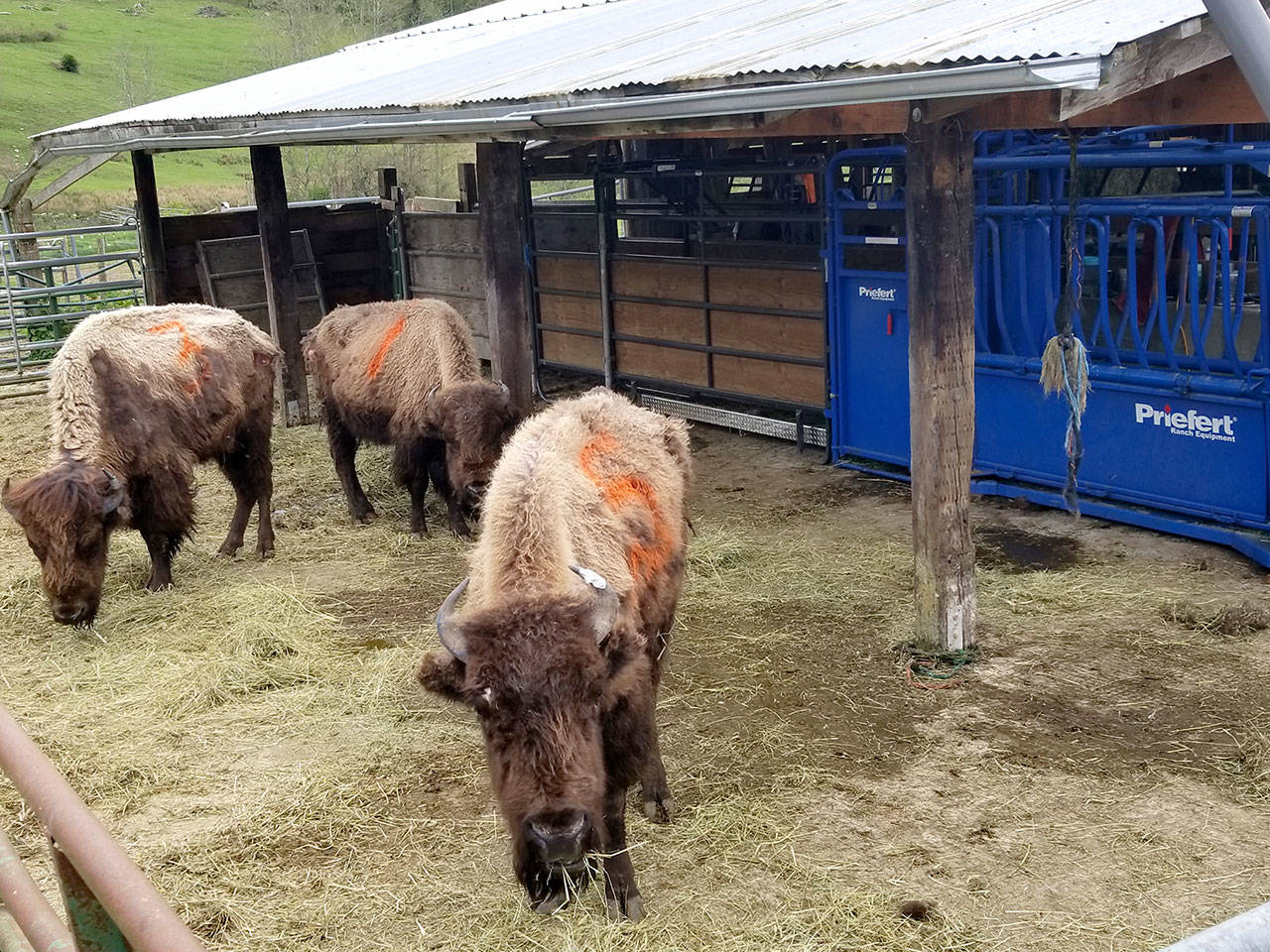CHIMACUM — Seven starving bison are under the care of a Quilcene rescue facility after they were removed from a Chimacum Valley field last month.
A 72-year-old Chimacum man awaits trial on animal cruelty charges.
Seven of the eight animals found at a property at state Highway 19 and Beaver Valley Road were removed April 25 and taken to Center Valley Animal Rescue at 11900 Center Road in Quilcene by order of Jefferson County.
Animal Control Deputy Terry Taylor had recommended prosecution based on the observations of veterinarian Jan Richards and Sara Penhallegon, director of the rescue, who met him on the property earlier in April, according to court records.
The property tenant, Dennis Lee “Denver” Shoop, 72, has been charged with eight counts of first-degree animal cruelty. He pleaded not guilty at his arraignment in Jefferson County Superior Court last Friday. The trial date is set for July 30.
The maximum penalty for each count is 15 years in prison and/or a $10,000 fine.
Shoop was released on his own recognizance until trial with the requirements that he not go to the rescue shelter and that he relinquish temporarily control of all the bison; the bison may be moved to a sanctuary ranch, and the males were to be castrated, according to Superior Court Judge Keith Harper’s order.
Penhallegon and staff members devised a plan to rescue the animals and keep people safe during the process of taking them to the shelter. Four bulls and three cows were put in a stock trailer and transported to Center Valley Animal Rescue.
“These animals were in worse condition than I expected,” Penhallegon said.
“Some of them literally fell out of the trailer when we began to unload them because they were so weak and couldn’t walk well.”
All of the animals’ physical conditions were extremely poor, she said.
“On a scale of 1 to 9, all but one scored a 1. The other was barely a 2. Zero is dead,” Penhallegon said.
One animal, a male, was not transported because he showed dangerous, aggressive behavior toward rescuers, according to court records and is being fed hay and alfalfa on the property until he can be removed safely for examination and rehabilitation.
Shoop told Taylor that he had only 20 bales of hay in his barn and had been rationing them to conserve his supply. Shoop said he was financially incapable of buying more feed for the animals. His intention was to raise the animals for food.
He said he had not contacted any organizations for assistance and had not tried to sell the animals after a potential sale last fall did not materialize.
Drivers had reported to the Jefferson County Sheriff’s Office seeing a deceased animal and several emaciated bison on the property.
Taylor said he found on the property a dead animal and the skeletal remains of another bison that had died during the last few months, according to court records.
He said that there was little grass for grazing and a scarce amount of hay available for the eight remaining animals, some of which were stumbling due to general weakness.
Taylor said he had been told that four others had died over the winter and that their bodies had been removed.
Penhallegon, a licensed wildlife rehabilitator and licensed veterinary technician, had never treated buffalo before.
She contacted the National Bison Association for direction on how to care for them.
“They were a wealth of information for me,” she said. “It is a big effort to try to save these animals.”
The bison were put through a cattle chute to be examined. Blood samples were taken, and they received shots, vitamins, and other treatments, Penhallegon said. Some were given IV fluids.
All suffered from parasites, anemia, starvation and dehydration, she said.
Their ages were determined by dental charts. Penhallegon said they were all in the 3- to 5-year-old-range.
One female is pregnant and is close to delivering a calf, Penhallegon said Wednesday. She estimated the birth would occur within the next week. She plans to induce labor and admits that “the mother is so weak we could lose her, the baby, or both.”
Penhallegon said that the Center staff castrated the bulls. The estimated $10,000 bill will be paid by the county.
She said that one of the animals that staff members were able to weigh has gained 75 pounds in the last few weeks.
“The smallest bull weighed 400 pounds. The largest animal, the pregnant female, weighed 790 pounds,” Penhallegon said. “Typically, a healthy animal should weigh around 2,000 to 2,200 pounds.”
Through Penhallegon’s efforts, the animals will be relocated to a refuge when they are strong enough to be moved.
Refarm Sanctuary, a 107-acre nonprofit organization in Washougal in Clark County, has agreed to take the bison, she said.
Two of them will make the trip in the next two weeks. In time, the rest of the small herd will be relocated as well, Penhallegon said
To help the bison, Penhallegon suggests monetary donations to the Center, along with good quality alfalfa, or Timothy or orchard grass hay.
For more about the no-kill animal rescue and shelter, see http://centervalleyanimalrescue.org/ or call 360-765-0598. Hours at the center are from 11 a.m. to 3 p.m. Friday through Sunday.
________
Jefferson County Editor/Reporter Jeannie McMacken can be reached at 360-385-3225 or a jmcmacken@peninsuladailynews.com.

